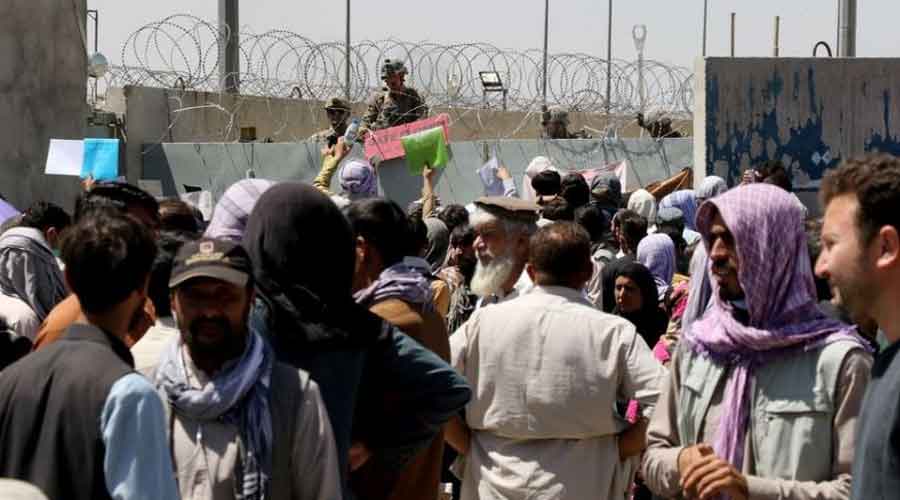Sitting in the home of the spy chief of the fallen Afghan government, cradling a Beretta sub-machine gun in his lap, Maulvi Habib Tawakol recounted how he and his fighters were surprised at how quickly they were ordered to enter Kabul on August 15, even after the Taliban’s rapid advance across Afghanistan.
That morning, Tawakol’s Taliban unit arrived on the outskirts of the Afghan capital, expecting to camp out there possibly for weeks while a formal handover was negotiated. But there would be little waiting. President Ashraf Ghani and many other senior officials were fleeing, catching everyone off guard.
“That afternoon, our leadership ordered us to enter the city in order to prevent looting,” he said. The Taliban intelligence chief, Hajji Najibullah, told him and his men to rush to the headquarters of the Afghan spy agency, the National Directorate of Security, to secure equipment and documents. Prison cells, offices, security posts — all had been abandoned.
“There was no one there except a deputy director, who handed the building to us,” Tawakol said. “All the prisoners had already escaped.”
Two weeks later, the Taliban are expected to formally announce their new government as early as Thursday, including naming the insurgency’s top religious figure, Sheikh Haibatullah Akhundzada, as the supreme leader of Afghanistan. But there is still an important gap between naming a government and fully taking up its functions, as Tawakol and other Taliban officials have found.
In Kabul, as in much of the country, most important government departments, apart from street-level security, are not functioning.
The Taliban have urged officials with the former government to stay in their roles, and some have. But in the face of a looming economic crisis, including a worsening cash shortage that has put strains on the availability of fuel, food and other staples, the past two weeks have been a scramble by the Taliban to establish themselves, both in the public eye and in practice, as the country’s new governors.
Much of the Afghan public remains deeply distrustful, given the harshness of the Taliban’s last government.
Although surprised by the rapid surrender of the Afghan government, the Taliban movement has been preparing to take power for more than a decade, steadily expanding its shadow government in waiting. Over the years, they have formed national commissions for sectors like health care and education, appointing officials down to the district level across much of the country.
Maulvi Bakhtar Sharafat, who served as an official during the previous Taliban regime, has been head of the Taliban’s public works commission since its inception three years ago, in charge of things including the repair and upkeep of roads and bridges.
On August 16, the day after Kabul’s fall, Sharafat was in Kandahar, on his way to inspect newly conquered
infrastructure in western Afghanistan. But that night, he received an urgent message from Mawlawi Muhammad Yaqoub, a senior Taliban leader who currently functions as the executive authority.
“I was told to please go and control your ministry in Kabul,” Sharafat recounted in an interview with The New York Times. With him were some staffers from the previous administration.
When he arrived in Kabul at the public works office, whose previous minister had fled, he met with the remaining staff and reassured them with the movement’s assurance of a general amnesty, part of a campaign to induce cooperation from civil servants, security officials, and the general public.
“People should not be afraid,” he said. “We should live together.”
While much of Kabul’s elite fled the country ahead of the Taliban, a few officials chose to remain at their posts. Wahid Majrooh, the Afghan minister of public health, said he turned down an offer to escape with President Ghani.
“I stayed in the office and took the risk,” he said in a recent interview. “If I leave, my directors and advisers will leave.”
The morning after the militants entered Kabul, Majrooh went to his office, where he was visited by the Taliban’s provincial health commissioner from neighbouring Logar Province.
“He was surprised to see me,” he said. “His behaviour was respectful, but he had no clear message.”
Majrooh, worried about an outbreak of violence or a mass casualty attack, wanted to ensure that his hospital network stayed open.
He suggested that he and the Taliban official go and rally the staff at two hospitals in a Hazara Shia neighbourhood in western Kabul, where residents would be most fearful of the Taliban’s arrival.
“He said, ‘Great idea, let’s go!’” Mr. Majrooh recalled.
For the past two weeks, Majrooh has shared his office with Maulvi Abdullah Khan, head of the Taliban’s health commission, whose cooperation he credited with helping coax staff back to work.
New York Times News Service











